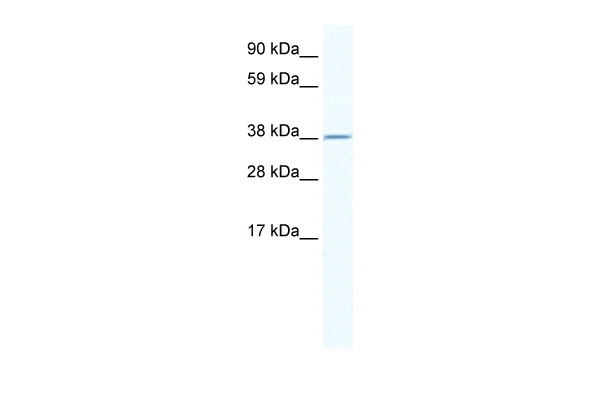RNF130 Antibody
| Code | Size | Price |
|---|
| PSI-27-746-100ul | 100ul | £609.00 |
Quantity:
Prices exclude any Taxes / VAT
Overview
Host Type: Rabbit
Antibody Clonality: Polyclonal
Regulatory Status: RUO
Target Species:
- Human
- Mouse
- Rat
Applications:
- Enzyme-Linked Immunosorbent Assay (ELISA)
- Western Blot (WB)
Storage:
For short periods of storage (days) store at 4˚C. For longer periods of storage, store RNF130 antibody at -20˚C. As with any antibody avoid repeat freeze-thaw cycles.
Images
Documents
Further Information
Additional Names:
RNF130, GP, G1RZFP, GOLIATH
Application Note:
RNF130 antibody can be used for detection of RNF130 by ELISA at 1:62500. RNF130 antibody can be used for detection of RNF130 by western blot at 2.5 μg/mL, and HRP conjugated secondary antibody should be diluted 1:50,000 - 100,000.
Background:
RNF130 contains a RING finger motif and is similar to g1, a Drosophila zinc-finger protein that is expressed in mesoderm and involved in embryonic development. The expression of the mouse counterpart was found to be upregulated in myeloblastic cells following IL3 deprivation, suggesting that this gene may regulate growth factor withdrawal-induced apoptosis of myeloid precursor cells.
Background References:
- Guais, A., et al., (2004) Biol. Reprod. 70 (1), 204-213.
Buffer:
Purified antibody supplied in 1x PBS buffer with 0.09% (w/v) sodium azide and 2% sucrose.
Concentration:
batch dependent
Conjugate:
Unconjugated
Immunogen:
Antibody produced in rabbits immunized with a synthetic peptide corresponding a region of human RNF130.
NCBI Gene ID #:
55819
NCBI Official Name:
ring finger protein 130
NCBI Official Symbol:
RNF130
NCBI Organism:
Homo sapiens
Physical State:
Liquid
PREDICTED MOLECULAR WEIGHT:
46 kDa
Protein Accession #:
NP_060904
Protein GI Number:
29788758
Purification:
Antibody is purified by protein A chromatography method.
Research Area:
Membrane ,Cancer ,Signal Transduction ,Apoptosis
Swissprot #:
Q86XS8
User NOte:
Optimal dilutions for each application to be determined by the researcher.



